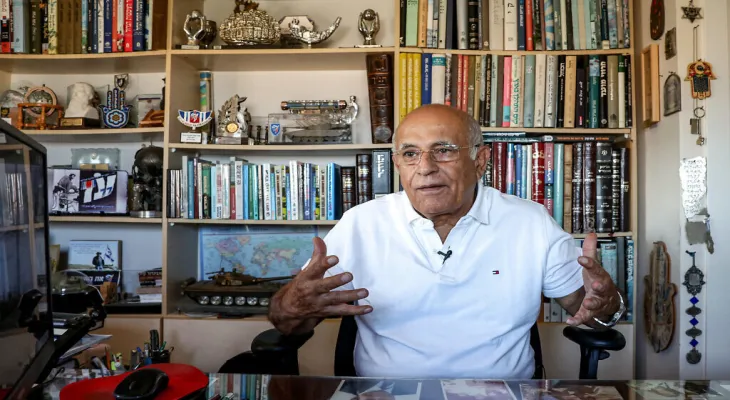Search here
Newspaper
Search here

Arab Canada News
News

Published: October 1, 2023
Avigdor Kahalani, a veteran of the Israeli forces who fought in the tank battles on the Syrian front during the Arab-Israeli War of 1973, remembers this, and despite the heavy losses his country incurred, he describes the conflict as "a slap in the face" that Israel desperately needed.
The double attack launched by Egypt and Syria on October 6 took Israel by surprise on the holiest day in the Jewish calendar – Yom Kippur – when the nation was facing a real dead end.
When the fighting broke out, Kahalani was 29 years old, a lieutenant colonel leading the 77th tank battalion in the Syrian Golan Heights, having just returned to active duty after spending a year in the hospital for severe burn treatment sustained during the Arab-Israeli conflict of 1967.
The 1967 War saw Israel occupy the Golan Heights, Sinai, the West Bank, and East Jerusalem, humiliating its enemies and significantly redrawing the regional map - but it also created what was later seen as a dangerous sense of complacency among Israelis.
Once the October 6, 1973, war erupted on two fronts, Kahalani realized that Israeli forces were vastly outnumbered, as the now 79-year-old recalled in an interview with Agence France-Presse at his home in Tel Aviv.
Kahalani added, "Syria had eight to ten times more tanks than Israel, and their tanks were better than ours."
He recalled, “Suddenly we realized it was an all-out war, and we were losing territory,” adding that within 24 hours, “Syrian forces” had nearly taken the entire Golan Heights, and there were moments when someone from the outside could have said, "You don't stand a chance."
He then added with a wry smile, "But we won," and within three days, Israeli forces appeared on the brink of defeat, as Syrian troops directly threatened core Israeli territory. However, in a dramatic turn of events on the battlefield, Kahalani's unit and the 7th armored brigade managed to halt the Syrian momentum.
The former tank commander said, "I had to lead the attack to retake the hills where we could stop them; then, about 160 tanks came on this line, and we were only 10 or 12 tanks that we had to stop."
After days of fierce fighting, the Syrians retreated. Kahalani stated that he personally disabled 45 out of 150 enemy tanks destroyed by his unit.
"It was a critical moment when every muscle in your body felt the stress, after four days of combat with almost no food, no sleep, and only a few rounds of ammunition left in your tank.
Kahalani, who is celebrated as a living legend in Israel and speaks regularly with young recruits, said, “You use every muscle, every thought, to be better than them, to win.”
In 1975, Kahalani received the Medal of Valor, Israel's highest military award, honoring his "outstanding leadership and personal heroism in a difficult and complex battle, whose outcome changed the course of the Golan Heights campaign."
After the initial debacle, Israel managed to correct the situation on the battlefield by mobilizing all reserve units and with support from the American airlift.
The Israeli forces launched a counter-offensive against Egypt and crossed the Suez Canal, while its soldiers in the north regained the Golan Heights. The fighting ended with a ceasefire approved by the United Nations on October 25.
Both sides sustained heavy losses during the three weeks of fighting. More than 2,600 Israeli soldiers were killed, and over 9,500 Arab soldiers were killed or missing.
Many historians believe that Israel's victory in 1967 instilled a sense of invincibility among its political and military leadership, thus, despite the heavy losses, Kahalani, who lost his brother in the conflict, views the 1973 war as a necessary wake-up call.
He stated that its impact was "a very strong slap in the face," considering it "brought our minds back to some extent."
Kahalani added, "If the reserve forces had been mobilized two days earlier, the war could have likely been avoided, but the members of then-Prime Minister Golda Meir's government were "hesitant," as Kahalani noted, "even when they had all the signals indicating that war was imminent."
He said that the shock of Israel's unpreparedness changed everything, referring to the deep soul-searching and high-level resignations that followed.
A year after the war, a commission was formed to investigate the level of Israeli military readiness and its response to the outbreak of war.
The Chief of Staff David Elazar and the head of military intelligence Eli Zeira resigned. Although Meir was not directly implicated by the committee, she resigned as Prime Minister in 1974.
The war had immense global repercussions. Arab oil producers doubled their crude oil prices and then doubled them again, a massive shock to the global economy. Egypt made peace with Israel in 1979, regaining Sinai.
Kahalani stayed in the army, reaching the rank of brigadier general before resigning and joining the Labor Party in 1992.
He later left to form a centrist party and served as Minister of Public Security in Benjamin Netanyahu's first government from 1996 to 1999.
For Kahalani, the 1973 war was the spark that drove Israel to develop more advanced weaponry, such as the Iron Dome missile defense system, achieving the military technological superiority it holds today.
But above all, the conflict served as a timely warning of Israel's "existential problem," which Kahalani says is now embodied in its arch-enemy, Iran.
Israel accuses Iran, whose leaders have repeatedly called for its destruction, of seeking to acquire nuclear weapons, a goal Tehran denies.
Kahalani spoke about a potential confrontation with Iran, saying, “The moment of truth will come; I have no illusions,” adding that when that day comes, he hopes that “Israel will have courageous leadership.”
Comments